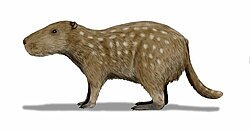| Fukomys Temporal range: Early Pliocene to Recent | |
|---|---|
 | |
| Fukomys anselli | |
| Scientific classification | |
| Kingdom: | Animalia |
| Phylum: | Chordata |
| Class: | Mammalia |
| Order: | Rodentia |
| Family: | Bathyergidae |
| Genus: | Fukomys Kock et al., 2006 |
| Type species | |
| Bathyergus damarensis | |
| Species | |
See text | |
Fukomys is a genus described in 2006 of common mole-rats, containing several species that were formerly placed in the genus Cryptomys ; [1] its species are endemic to Africa. The species contained in the genus includes:
- Fukomys amatus - Zambian mole-rat
- Fukomys anselli - Ansell's mole-rat
- Fukomys bocagei - Bocage's mole-rat
- Fukomys damarensis - Damaraland mole-rat
- Fukomys darlingi - Mashona mole-rat
- Fukomys foxi - Nigerian mole-rat
- Fukomys hanangensis - Hanang mole-rat
- Fukomys ilariae - Somali striped mole rat [2]
- Fukomys kafuensis - Kafue mole-rat
- Fukomys livingstoni - Livingstone's mole-rat
- Fukomys mechowii - Mechow's mole-rat
- Fukomys micklemi - Micklem's mole-rat
- Fukomys occlusus
- Fukomys ochraceocinereus - Ochre mole-rat
- Fukomys vandewoestijneae - Caroline's mole rat [3]
- Fukomys whytei - Whyte's mole-rat
- Fukomys zechi - Ghana mole-rat














